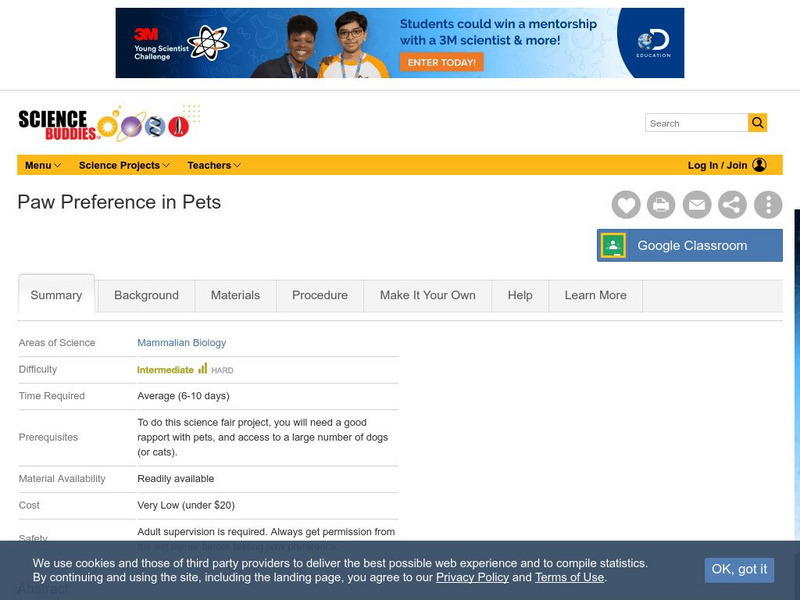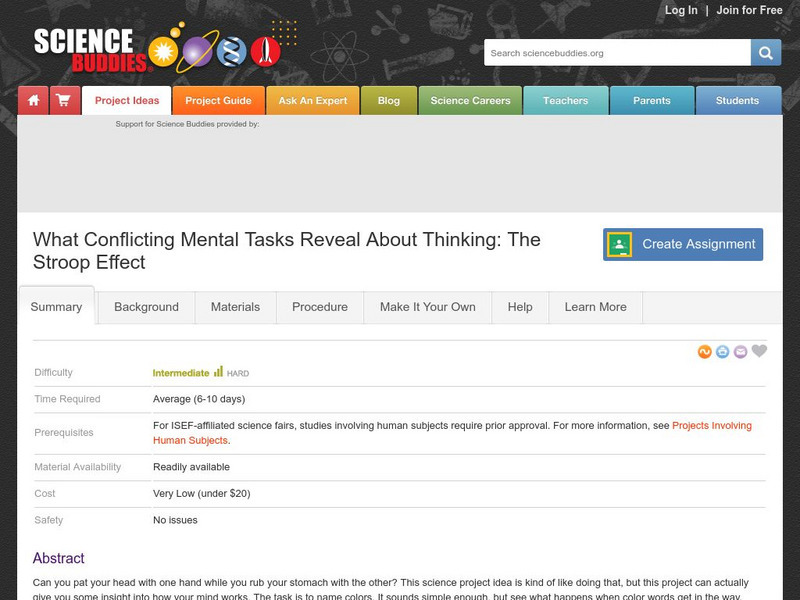Hi, what do you want to do?
Smarter Balanced
How the Brain Works
Cerebrum, cerebellum, brainstem, pituitary gland, and spinal cord. Prepare your class for a performance task assessment on the brain and how it works with a scripted plan that defines these terms and identifies the functions the...
Howard Hughes Medical Institute
Classroom Activities: Mirror-Tracing Activity
What does it take to train your brain? Learners explore the question as they experiment with their own memory and motor skills. They attempt to trace an object using a mirror and then score their results over several trials. They then...
Curated OER
Nervous System
Get to know the body's central nervous system through an engaging game of nervous system telephone. But this isn't your average game of telephone. Here, pupils must find a way to communicate a message to the brain without speaking....
Curated OER
The Digestive System
Discover how the human body's digestive system works with a brain and stomach friendly activity. Scholars taste test a variety of foods to find out how they behave once in the mouth. Class members then play a game called Move That...
Exploratorium
Seeing Your Blind Spot
Viewers use a small, dimmed flashlight to identify the blind spot for both the right and left eye. It is a simple activity to incorporate into your activities during a lesson on vision and the structure and function of the eyeball.
PBS
Color Code
Don't let your brain play tricks on you! Learners test brain reaction rates while it is receiving multiple stimuli. They time each other reading a set of color words written in different colors and again when they are written in black....
Early Childhood Learning and Knowlege Center
My Body My Senses
In a comprehensive unit of activities, learners explore the five senses. Youngsters discover the many different body parts and their functions that allow humans to have sense of sight, touch, smell, taste, and hearing. The best way to...
Curated OER
Phonemic Awareness and Sounding Out Words
Although designed for children with learning disabilities, such as dyslexia, the multi-sensory tips and tricks included in this illustrated eight-page packet are designed to develop phonemic awareness and are appropriate for any classroom.
Other
Society for Neuroscience: Brain Facts [Pdf]
This is a publication on the human brain and how it works. Gives details on the neuron, how the senses interact with the brain and much more. PDF (requires Adobe Reader).
National Institutes of Health
Spatial Short Term Memory Pinpointed in Brain
Examine this press release to understand methods used in the science of psychology to pinpoint functions of the brain.
Science Buddies
Science Buddies: The Brains Behind 'Where's Waldo?'
What makes you notice someone in a crowd? Why do some things stand out, while others melt into the background? In this experiment you can investigate the psychology of how things get noticed, by studying how our brains perform a visual...
TeachEngineering
Teach Engineering: Hearing: How Do Our Ears Work?
Students learn about the anatomy of the ear and how the ears work as a sound sensor. Ear anatomy parts and structures are explained in detail, as well as how sound is transmitted mechanically and then electrically through them to the...
PBS
Pbs Learning Media: Everest: Test Your Brain Under Low Oxygen Conditions
This interactive feature from the NOVA: "Everest" Web site lets you take the same brain quizzes that researchers have used to test the brain function of climbers on Mount Everest.
National Geographic
National Geographic: Seeing Is Believing
In this lesson, students investigate the properties of light using simple materials. Includes handout and video resources.
PBS
Pbs Teachers: Test Your Brain
Investigate the effect of oxygen deprivation on brain function and test the changes in mental abilities climbers experience as they climb to ever-higher altitudes, in this virtual experiment.
PBS
Pbs Teachers: Mystery of the Senses Vision
Understand how our brain identifies an object, view six optical illusions and explain why the visual system might interpret them the way it does.
Science Buddies
Science Buddies:brain Body Connection: Can Exercise Make Our Brains Work Better?
We all know physical exercise is important to keeping our bodies fit. But how important is physical exercise to your brain? In other words, is there any connection between an active body and increased brain power? This is an easy project...
TeachEngineering
Teach Engineering: That's Hot! Robot Brain Programming
With the challenge to program computers to mimic the human reaction after touching a hot object, students program LEGO robots to "react" and move back quickly once their touch sensors bump into something. By relating human senses to...
University of Washington
University of Washington: Neuroscience for Kids: Stroop Effect
Do words or colors have more influence over what you read? Try this interactive Stroop Effect test to find out what causes the results.
Science Buddies
Science Buddies: Multitasking: Brain Drain or Boost in Efficiency?
Think it's a good idea to plug into iTunes, surf the Web, or watch TV while doing homework or trying to read? Many people do it and claim that jumping from one activity to another keeps their attention level up and even gives their brain...
Science Buddies
Science Buddies: Paw Preference in Pets
The great majority of people have a distinct hand preference. The goal of this science fair project is to determine whether non-primate mammals (e.g., dogs or cats) have a paw preference, which might indicate lateralization of function...
Science Buddies
Science Buddies: What Conflicting Mental Tasks Reveal About Thinking
Can you pat your head with one hand while you rub your stomach with the other? This experiment is kind of like that, but it can actually give you some insight into how your mind works. The task is to name colors. It sounds simple enough,...
PBS
Pbs Teachers: Scientific American: Don't Forget! Memory Tests 9 12
Explore scientific research that says continued brain activity may delay or slow the loss of memory function. Investigate and practice different techniques to increase recall.
PBS
Pbs Teachers: Scientific American: Memory Tests
Explore scientific research saying that continued brain activity may delay or slow the loss of memory function. Investigate and practice different techniques to increase recall.













![Society for Neuroscience: Brain Facts [Pdf] Activity Society for Neuroscience: Brain Facts [Pdf] Activity](https://content.lessonplanet.com/knovation/original/113866-cd2169bec6c0105fc678c671521bd642.jpg?1661266885)














